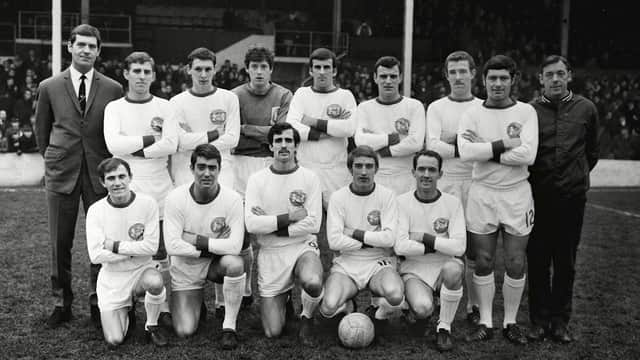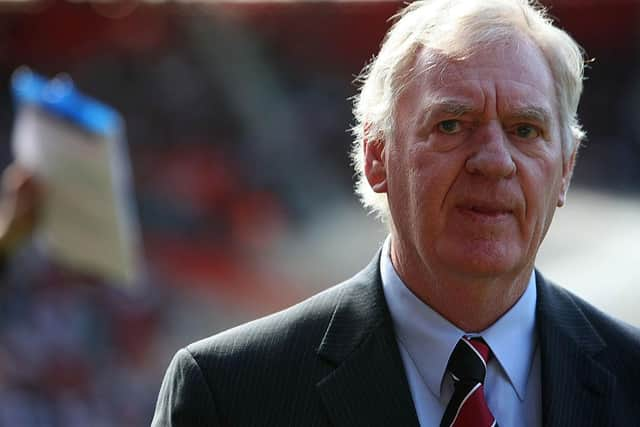Sporting Memories: McMenemy's Men - the story of Doncaster Rovers' 1968/69 season


They had won the league’s bottom division by the slenderest of margins in 1965-66, their first divisional title for 16 years.
However, it was not to be a launch pad for greater things. In September 1966 Rovers’ captain, the popular and influential John Nicholson, was killed in a car accident.
Advertisement
Hide AdAdvertisement
Hide AdThe tragedy affected Rovers badly and they were relegated from Division Three, conceding 117 league goals in the process.
For 1967-68, back in Division Four, player-manager Keith Kettleborough was replaced by George Raynor. A Yorkshireman, Raynor was a vastly experienced coach, who had done much of his work abroad.
As coach of the Swedish National team he had an Olympic gold medal and a World Cup runners-up placing on his CV.
He set about reshaping the squad so that at the start of the 1968 season only two players from 1965-66 remained, the versatile Bob Gilfillan and Rovers legend Alick Jeffrey, whose tally of league goals stood at 115 on the eve of the season.
Advertisement
Hide AdAdvertisement
Hide AdRaynor had signed goalkeeper John Gavan, full-backs Harold Wilcockson and Colin Clish and midfielder Chris Rabjohn, the latter three all arriving from Rotherham United in a player exchange.


They joined club captain Stuart Robertson, a centre-back, midfielder John Flowers, strikers Rod Johnson and Keith Webber and winger Brian Usher. Along with local-born youngsters John Bird and Stewart Gray, this squad had a solid look about it.
During the season Rovers added to this squad. Goalkeeper John Ogston arrived on loan from Liverpool early in the season, initially as cover for Gavan, but he established himself as number one.
John Regan, a centre-forward and John Haselden, a centre-back, arrived from Crewe Alexandra and Rotherham United respectively during September.
Advertisement
Hide AdAdvertisement
Hide AdGraham Watson returned to the club in January after a spell at Rotherham and striker Steve Briggs came from Leeds United in February. All were to play key roles in Rovers’ push for the title.
But we are getting ahead of ourselves: the season started on Saturday August 10, 1968 and Rovers began with a 1-1 draw at home to Bradford City, Gilfillan scoring the goal.
Their first win came in the third game of the season, a 4-3 victory over Scunthorpe United after Rovers had been two down, Jeffrey scoring twice.
They followed that up with a 2-1 win at Colchester United but form continued to be patchy until September.
Advertisement
Hide AdAdvertisement
Hide AdThen Rovers won five on the bounce, starting off when Jeffrey scored a hat trick in the 2-1 home win over Exeter City.
This took Rovers to second in the table, level on points with Darlington, who were due at Belle Vue on Friday October 4.
The prospect of second versus first excited the Doncaster public and with a large contingent travelling from Darlington, the attendance was a season’s record 22,268. An excellent game ensued but didn’t produce the result Rovers desired, Kirk’s second half goal winning the game for the Quakers.
Rovers bounced back with a 4-3 win over another early pace-setter, Chester, but this was to be as good as it got for a while.
Advertisement
Hide AdAdvertisement
Hide AdFrom the next six games Rovers managed only one win and one draw. This prompted George Raynor to offer his resignation as manager, although he remained with the club looking after the youth team.
As Rovers searched for a new boss, chief scout Jackie Bestall, who had managed the club three times before, took the reins.
Bestall did rather well, seeing his charges beat Notts County in a FA Cup first round tie before goals from recent signings Haselden and Regan secured a 2-1 win at Aldershot.
On Friday November 29, 1968 the Rovers board announced the new manager.
Advertisement
Hide AdAdvertisement
Hide AdHe was 32-year-old Lawrie McMenemy, coach at Rovers’ neighbours Sheffield Wednesday and he came with a glowing testimonial from Wednesday manager Alan Brown.
McMenemy, a former Coldstream Guardsman, had managed Gateshead and Bishop Auckland but had never played for or managed a Football League club.
Although Rovers rewarded the new boss with a league win over Grimsby Town and progressed to the third round of the FA Cup by beating Southport, their form remained patchy.
A nil-nil draw on Boxing Day at Darlington’s Feethams seemed rather underwhelming at the time but later it took on greater significance.
Advertisement
Hide AdAdvertisement
Hide AdRovers had a distraction, in the form of a FA Cup date against the mighty Liverpool at Anfield.
In front of a crowd of 48,330, Rovers acquitted themselves well and earned praise from Liverpool boss Bill Shankly but went down 2-0 to goals from England internationals Roger Hunt and Ian Callaghan.
Back to that Boxing Day draw at Darlington: it was the start of an amazing unbeaten run of 21 league games, a club record.
The highlight was a 7-0 win over then league leaders Aldershot at Belle Vue on Tuesday February 25, 1969.
Advertisement
Hide AdAdvertisement
Hide AdNew signing Briggs marked his debut with a goal, and there were also scores for Regan, Watson (2), Robertson, Usher and Clish, the result putting Rovers top of the division.
They almost repeated the dose in early April, when after three nil-nil draws they hammered Brentford 5-0.
Briggs, Regan (2), Watson and an own goal showed Rovers’ attack was in good spirits.
The Brentford win put Rovers five points clear at the top of Division Four, and with five games remaining they just needed to hold their nerve.
Advertisement
Hide AdAdvertisement
Hide AdClish’s goal gave them a 1-0 win at Peterborough United before their long unbeaten run ended when Brentford claimed quick revenge with a 1-0 win.
Rovers’ next two games were at home: Regan and Watson gave the home side a 2-0 win over Port Vale but then Rovers were held 0-0 by Workington.
Calculations showed that Rovers could finish no lower than fourth, and so were effectively promoted, but McMenemy wanted the title.
The final game was scheduled for Monday April 28 away at Grimsby Town but heavy rain forced a postponement and the game was put back a week.
Advertisement
Hide AdAdvertisement
Hide AdGrimsby were second-bottom of the division and their fans were outnumbered by around 3,000 travellers from Doncaster.
Briggs gave Rovers the lead five minutes before the break and then Watson added a second early in the second half.
Grimsby pulled a goal back but with 12 minutes remaining skipper Robertson headed home the decider.
Rovers had won 3-1 and were crowned champions of Division Four.
Advertisement
Hide AdAdvertisement
Hide AdHalifax Town, Rochdale and Bradford City would join them in Division Three for 1969-70.
In common with the 1965-66 triumph, 1968-69 didn’t prove to be a springboard to better things.
Rovers were relegated two seasons later and McMenemy found himself out of a job.
Rovers spent the next decade in the bottom division and didn’t win a divisional title again until 2003-04, by which time they’d had a spell outside the Football League.
Advertisement
Hide AdAdvertisement
Hide AdMcMenemy fared rather better: he moved to Grimsby Town, whom he led to the Fourth Division title in 1971-72.
Then he spent 12 years with Southampton, who won the FA Cup and returned to the top flight under his stewardship.
He also coached England’s under 21s and managed Northern Ireland.
Not bad for someone who started his career at the Rovers.